
Civil Service Live is an opportunity for civil servants to learn, network and collaborate. As a new member of the Civil Service Leadership & Governance Team, that’s exactly what I’ve been doing. At this year’s Civil Service Live events I’ve been talking to civil servants of all grades, in different types of roles and organisations, about their experiences of leadership.
The People and Leadership theme throughout Civil Service Live featured many fantastic presentations and workshops.
It was particularly inspiring to hear from Detective Superintendent Theresa Breen about leading in the challenging environment of the Metropolitan Police. She spoke with real passion about seeing the effects of crime first-hand and how that shaped her approach to leading and policing in general. It reminded me of the importance of knowing why you come to work and how an inspiring leader can help you understand that. Theresa’s clear purpose is a great motivator for the people she leads and the public she serves.
This was food for thought and I‘ve been reflecting on it ever since.
Leadership Statement Competition
Reflecting and learning are important parts of improving leadership. That’s why we asked people at CS Live to share their experiences of leaders and the impact they had by entering the Leadership Statement Competition. The winner from each CS Live event receives a mentoring session from a top leader with extensive experience in business or government.
The entries have been fascinating. It was particularly interesting to read real-life examples of how small gestures or changes in behaviour can have a big and lasting impact. There were lots of great entries, and we've chosen the most inspiring story from each event. We feel these best exemplify how everyone can learn from experience, acquire skills and make changes to become more inspiring, confident and empowering leaders.
And the winners are...
Newcastle - 10 September
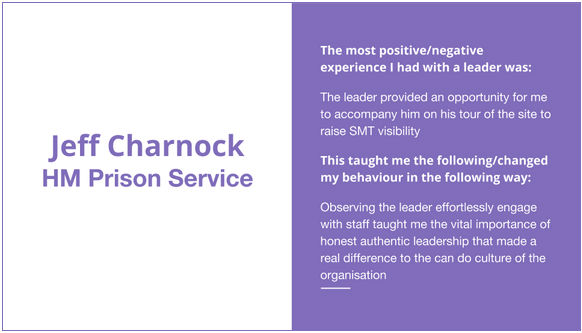
Jeff recognises how visible leadership can empower others and build leadership capability. He also hints at the scale of the challenge we face, and the importance of collective leadership in a Civil Service comprising many different organisations.
Manchester - 14 September
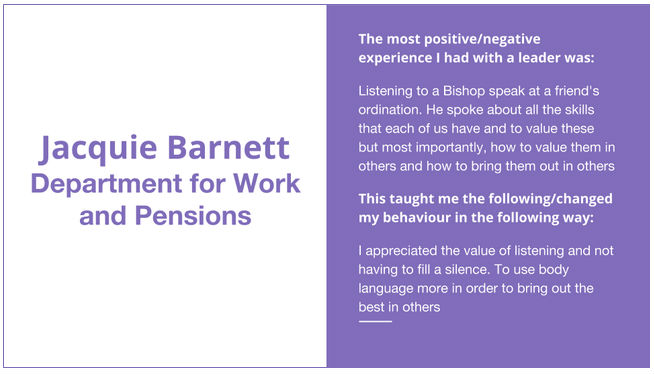
Jacquie showed how inspirational leadership can come from anywhere, encouraging people to modify their behaviour, often through small adjustments, to the benefit of others.
Bristol - 22 September
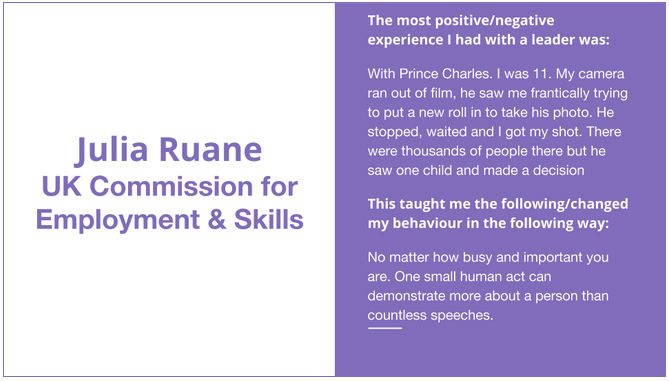
Julia’s example helps us to remember the lasting impact of one superficially small but significant gesture. In this instance, that gesture is inspiring positive behaviour many years later, and reminds us that leaders’ behaviour is always under scrutiny.
Edinburgh - 29 September
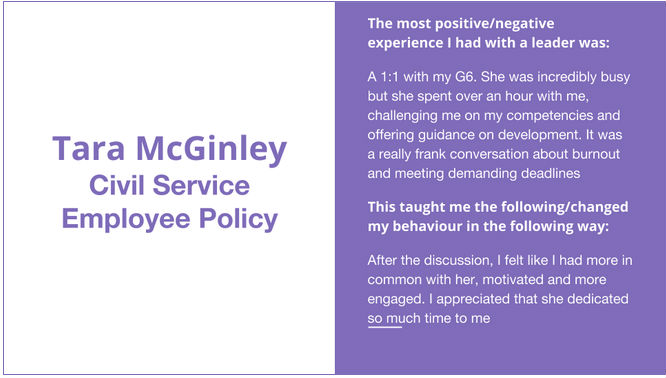
Interpersonal skills play a part in each of the behaviours in the Leadership Statement. Tara’s example shows how good interpersonal skills can support confidence in engagement. When used to challenge people constructively, straightforward communications and clear and honest feedback can encourage individuals out of their comfort zone.
London - 5 October
A big part of being a leader is to enable other leaders. Glenda’s experience illustrates the importance of empowerment in this. Empowering behaviour can be uncomfortable, but people need to be given space to take risks, and this ultimately can inspire the confidence people need to be the best leader they can be.
London - 6 October
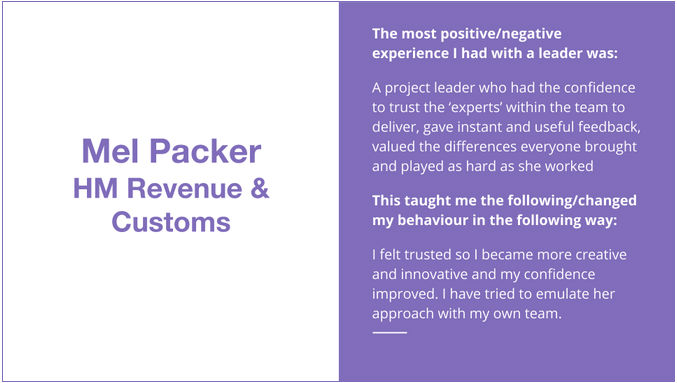
Confidence underpins so much of our behaviour. Working in a team with mixed knowledge and skillsets, it’s important for leaders to build opportunities for collaboration. Leaders who recognise the value of all their staff instill confidence in them, as this one did in Mel, and everyone reaps the benefits. Confident staff are more innovative, creative and all-round higher performers.
Why not add your comment below to share with others how a positive role model has changed the way you work?


17 comments
Comment by Marie O posted on
I have one of the best leaders i have worked with in the 16 years of being a civil servant. My previous experience has been of leaders who delegate too much and one who was far from approachable and undermining, full of their own self importance. My manager now is a real people person which, in this ever stressful environment is a breath of fresh air. She herself has gone through so much change in work in the past twelve months but she has stayed positive and motivating and is always happy to talk to both her managers under her and their staff too. It is important to be focussed on the job in hand but it is also just as important if not more to focus on your people and lead by example because if you don't have the support of your people you have nothing
Comment by Diane R posted on
I think it is good to see winners who have had supportive managers and the managers are shown to be exemplars of good leadership and how it should be. Yes, there are some poor/ineffective managers but the in my opinion the focus should be on the behaviours and how they can be improved with simple steps. How I do think it is clear from some of the comments that performance management feedback needs to be 360 degrees for all line managers at every level.
Comment by Joe posted on
Interesting blog! Very much agree on the last point on confidence. I once spent time in a role where my line manager often compared me unfavourably against other people who had performed the role in the past. It was not a pleasant experience, and led me into a bit of a vicious circle where I was not feeling confident in my work and not looking forward to coming in, so my performance suffered too.
In my next role I experienced the exact opposite, and had a line manager who was very supportive and quick to praise good performance. My confidence levels soared, I enjoyed the role much more and as a result found it far easier to take the initiative with tasks.
Comment by TASNEEM posted on
I think we need to differentiate between a leader and a manager, a leader is someone who demostrates a democratic style of leadership, apporachable, professional competent and can deal with challenging situations at the same time, without being aggressive. We dont have many leaders around and we need to work towards this, not sure how, though. We need to educate our managers to be leaders and not managers.
Comment by JS posted on
It is really important to highlight negative leadership where it happens but I agree that all postive examples should be celebrated and used as examples of what we should all aspire to.
Poor leadership can have a really damaging impact on the confidence, self belief, health and even the career of those who you lead. Clearly nobody's going to want to stand up and give real life examples but I suspect that this would be as powerful as some of the more positive stories in terms of building a culture where everyone feels that they are part of well run teams and really negative behaviour from leaders is seen to be totally unaccpetable..
Comment by Dami posted on
I do understand that there is alot of negativity around, and this is why the most inspiring comments were positive. This could be attributed to the fact that when negative traits in leadership are pointed out it sounds more like a whinge or personality clash. Just as those who gave positive feedback were inspiring, so could a negative one.
I experienced a leader showing some negative traits of not listening, forming a cartel and never being there. When I was in a position of leading others, I constantly ensured that I avoided those negative traits I had observed. Therefore I was inclusive, took time to listen and was very visible. This made a marked difference in my team's perception of leadership.
Comment by Andy posted on
I'd say the best bit of leadership I've seen recently was from a manger who exibited some very poor behaviour which impacted on the performance assessment of a member of staff. When it was pointed out to him quite why his behaviour was out of line he acknowledged the mistake and took immediate action to undo the damage - which involved explaining his poor behaviour to his seniors.
Of course it would have been better not to get things wrong to start with, but being prepared to listen to constructive criticism and take responsibility for your mistakes is a real leadership skill not often seen. It encourages trust and openness across the organisation.
Comment by MAC posted on
We have read this in the office and have to say you are absolutely spot on - then it takes another three months of meetings and huge team effort to produces slides for presentations for someone to be able to analyse and make a decision on the solution - which will probably be "lets have a meeting with..."
Comment by Jim posted on
Here's a bad trait you can explore: leaders who won't take responsibility or make a decision. Instead, they commission a report, call a meeting (which can't happen for 3 months) or engage some consultants, simply so they can postpone any hint of accountability until they've moved on to another job. It's easy to climb the greasy pole if nobody can pin anything on you.
I see this frequently with senior managers who don't understand the subject matter, and who will neither delegate the decision to someone competent, nor admit their inability to handle it themselves. It may be that they're too busy to deal with it, but that's little excuse.
It's more pronounced than it used to be; 10 or 20 years ago, we mere mortals were allowed to do things on our own initiative so SCS paralysis didn't stop anything. Now everything has to be approved by the right dozen people from commercial / legal / finance / policy / HR / programme management / operational / IT / procurement / Cabinet Office / etc, few of whom can be expected to understand it. And it only takes one to bring a project to a shuddering halt.
Comment by John posted on
Really nice to see some positive examples of leadership. Unfortunately I fear the staff survey results will relect the other end of the spectrum....especially as at last the questions now differentiate between local and senior management.
Comment by Nick Short posted on
It is important to examine bad traits but if you're going to do that it would be useful to have a 'what to do if your leader demonstrates x behaviour' and a 'what to do if your feedback shows YOU have x behaviour'. We do a lot of complaining (and there is lots to work on!) but it's only worthwhile if there's a fix!
Comment by Andy W. posted on
Totally agree with Nick's comment. So much of staff's frustration comes from just not knowing what to do in a situation where a manager is not demonstrating the leadership qualities that we are being assured they should/will, and that is clearly not being addressed by THEIR managers. And frustration is so often the first step on the slippery slope to finding oneself on the "Attitudes & Behaviours Must Improve" list...
Comment by Joe Williams posted on
And thanks for the suggestion, we might revisit this with a new blog talking about some of the bad traits sometimes seen in leaders which can frustrate people in the future.
Comment by SB posted on
Interesting how all the winners had written about a positive leadership experience. How many entrants submitted a negative experience?
Comment by Joe Williams posted on
Hi there. We received over 170 applications to the competition. Both positive and negative experiences of leadership were described in people's entries. A few entries describing negative experiences were short-listed, but we felt the winning responses were particularly inspirational and good at explaining how they changed their behaviour.
Comment by Simon Dicketts posted on
But life isn't like that, is it. It's not all good. Some of it is actually bad. I had precisely the same reaction as SB after reading through this lot, and if I did, and he did.............
You do yourselves no favours at all by this constant pretence that everything in the garden is lovely. It isn't. Really, it isn't. Take a look at any blog on PMR, and see what people say about "leaders" there.
And why has this blog been set up with an American dictionary instead of an English one? How do I know? Because it redlines favours and pretence until I change them to favors and pretense.
Genius at work.
Comment by Blog team posted on
We have no idea why the site is set up as American English. I've asked GDS what the deal is with this and hopefully we'll be able to change the setting as soon as possible.